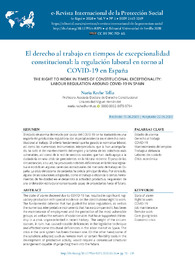Por favor, use este identificador para citar o enlazar este ítem:
https://hdl.handle.net/11000/34407Registro completo de metadatos
| Campo DC | Valor | Lengua/Idioma |
|---|---|---|
| dc.contributor.author | Reche Tello, Nuria | - |
| dc.contributor.other | Departamentos de la UMH::Ciencia Jurídica | es_ES |
| dc.date.accessioned | 2025-01-11T16:38:30Z | - |
| dc.date.available | 2025-01-11T16:38:30Z | - |
| dc.date.created | 2020-06 | - |
| dc.identifier.citation | E-Revista Internacional de la Protección Social, 2020 Vol. Nº 1 | es_ES |
| dc.identifier.issn | 2445-3269 | - |
| dc.identifier.uri | https://hdl.handle.net/11000/34407 | - |
| dc.description.abstract | El estado de alarma decretado por causa del COVID-19 se ha traducido en una importante producción regulatoria con especial incidencia en el derecho constitucional al trabajo. El criterio fundamental que ha guiado la normativa laboral, así como los numerosos instrumentos interpretativos que la han acompañado, ha sido el del mantenimiento del empleo y la tutela de los colectivos más vulnerables, así como de la red de servicios sociales que han dado apoyo a la ciudadanía en una crisis sin precedentes en la historia reciente. El peso de las circunstancias, a su vez, ha provocado notables deficiencias en la técnica legislativa e incidido en algunas carencias estructurales del mercado de trabajo en España. La crisis del sistema de cuidados ha sido la principal de ellas. Por otro lado, alguna de las soluciones adoptadas, como el trabajo a distancia o ciertas herramientas de flexibilidad en el desarrollo la actividad productiva, requerirían de una ordenación estructural consensuada capaz de proyectarlas hacia el futuro. | es_ES |
| dc.description.abstract | The state of alarm decreed due to COVID-19 has resulted in significant regulatory production with special incidence on the constitutional right to work. The fundamental criterion that has guided the labor regulations, as well as the numerous interpretative instruments that have accompanied it, has been the maintenance of employment and the protection of the most vulnerable groups, as well as the network of social services that have supported citizenship in a crisis unprecedented in recent history.. The weight of the circumstances, in turn, has caused notable deficiencies in the legislative technique and affected some structural deficiencies in the labor market in Spain. The crisis in the care system has been the main one. On the other hand, some of the solutions adopted, such as remote work or certain flexibility tools in the development of productive activity, would require a consensual structural arrangement capable of projecting them into the future. | es_ES |
| dc.format | application/pdf | es_ES |
| dc.format.extent | 66 | es_ES |
| dc.language.iso | spa | es_ES |
| dc.publisher | Universidad de Sevilla | es_ES |
| dc.rights | info:eu-repo/semantics/openAccess | es_ES |
| dc.rights | Attribution-NonCommercial-NoDerivatives 4.0 Internacional | * |
| dc.rights.uri | http://creativecommons.org/licenses/by-nc-nd/4.0/ | * |
| dc.subject | Estado de alarma | es_ES |
| dc.subject | Derecho al trabajo | es_ES |
| dc.subject | COVID-19 | es_ES |
| dc.subject | Mantenimiento del empleo | es_ES |
| dc.subject | Trabajo a distancia | es_ES |
| dc.subject | Labores de cuidado | es_ES |
| dc.subject | Crisis económica | es_ES |
| dc.subject | State of alarm | es_ES |
| dc.subject | Right to work | es_ES |
| dc.subject | COVID-19 | es_ES |
| dc.subject | Job maintenance | es_ES |
| dc.subject | Remote work | es_ES |
| dc.subject | Care-giving tasks | es_ES |
| dc.subject | Economic crisis | es_ES |
| dc.subject.other | CDU::3 - Ciencias sociales::34 - Derecho | es_ES |
| dc.title | El derecho al trabajo en tiempos de excepcionalidad constitucional: la regulación laboral en torno al COVID-19 en España | es_ES |
| dc.type | info:eu-repo/semantics/article | es_ES |
| dc.relation.publisherversion | http://dx.doi.org/10.12795/e-RIPS | es_ES |

Ver/Abrir:
E-RIPS_vol_5_n_1_06_nuria_reche_tello.pdf
752,76 kB
Adobe PDF
Compartir:
 La licencia se describe como: Atribución-NonComercial-NoDerivada 4.0 Internacional.
La licencia se describe como: Atribución-NonComercial-NoDerivada 4.0 Internacional.
.png)